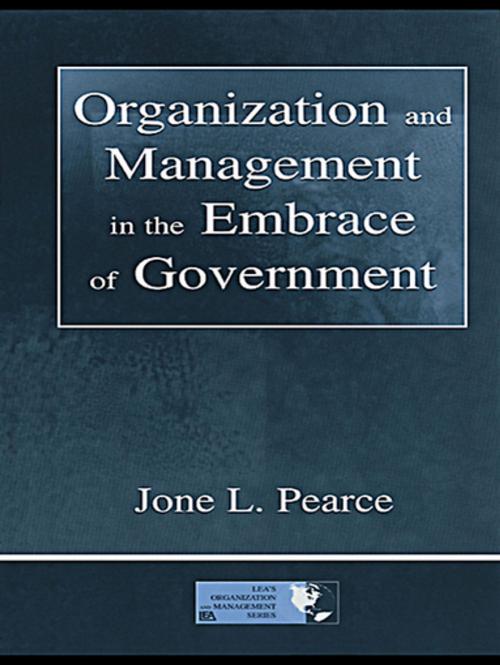Organization and Management in the Embrace of Government
Business & Finance, Management & Leadership, Management| Author: | Jone Pearce, Jone Pearce | ISBN: | 9781135651220 |
| Publisher: | Taylor and Francis | Publication: | May 1, 2001 |
| Imprint: | Psychology Press | Language: | English |
| Author: | Jone Pearce, Jone Pearce |
| ISBN: | 9781135651220 |
| Publisher: | Taylor and Francis |
| Publication: | May 1, 2001 |
| Imprint: | Psychology Press |
| Language: | English |
Organization and Management in the Embrace of Government is an original exploration of how governments affect the ways people organize themselves, manage those organizations, and respond to the organizations thus created. It is a grounded theory of how governments that are weak, erratic, or hostile undermine complex organization, trust, meritocracy, commitment, and other implicit expectations about how organizations operate. Scholars, students, and all those interested in a better understanding of how governments affect our cultural expectations of one another, our organizations, and the economies based upon them will find this groundbreaking volume to be a rich resource.
The author, President-Elect of the Academy of Management, distills original comparative data drawn from China, Hungary, the Czech Republic, Lithuania, and the United States to paint a coherent theory of the organizational effects of governments. The book has been written primarily to introduce organizational and governmental scholars to the ways that governments can influence organization and management. However, it also is written with an eye to readers with practical interests in international management or governments. This pioneering work will be discussed and analyzed for decades to come.
Organization and Management in the Embrace of Government is an original exploration of how governments affect the ways people organize themselves, manage those organizations, and respond to the organizations thus created. It is a grounded theory of how governments that are weak, erratic, or hostile undermine complex organization, trust, meritocracy, commitment, and other implicit expectations about how organizations operate. Scholars, students, and all those interested in a better understanding of how governments affect our cultural expectations of one another, our organizations, and the economies based upon them will find this groundbreaking volume to be a rich resource.
The author, President-Elect of the Academy of Management, distills original comparative data drawn from China, Hungary, the Czech Republic, Lithuania, and the United States to paint a coherent theory of the organizational effects of governments. The book has been written primarily to introduce organizational and governmental scholars to the ways that governments can influence organization and management. However, it also is written with an eye to readers with practical interests in international management or governments. This pioneering work will be discussed and analyzed for decades to come.















